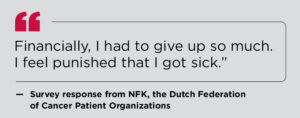Financial Toxicity of Lung Cancer in the Netherlands
NB: This article appears in the ILC News. You can read the full article here.

EVEN WHEN TREATMENT COSTS ARE COVERED, THE MAJORITY OF LUNG CANCER PATIENTS EXPERIENCE INCREASED EXPENSES AND/OR REDUCED INCOME FOLLOWING THEIR DIAGNOSES.
By: Anne-Marie C. Dingemans, MD, PhD, Jente Klok, MSc, Lidia Barberio, MSc, Vivian Engelen, PhD, and Roel Masselink, MSc
on: May 11, 2022 In: PATIENT ADVOCACY

Anne-Marie C. Dingemans, MD, PhD
Editor’s Note: This is one of two articles exploring the implications of financial toxicity in lung cancer in [this] edition of ILCN. Read the other article here and look for more on this subject in the coming months. You can also learn more by listening to IASLC’s podcast on the subject.
“Financially, I had to give up so much. I feel punished that I got sick.”
That’s one of the responses from a lung cancer patient in an online questionnaire from NFK, the Dutch Federation of Cancer Patient Organizations.1
This patient’s experience is not unique.2 Almost 80% of the lung cancer patients who responded to the questionnaire indicated that they experienced increased expenses and/or less income after diagnosis. However, to date, most health care providers in a country with well-organized healthcare like the Netherlands have not considered that patients will experience such financial distress. In this article, we describe the patient-level impact of the cost of lung cancer—what we call “financial toxicity.”
The article continues, outlining the financial arrangements within cancer healthcare in the Netherlands, and then experiences as reported by patients surveyed for the study.
… a little background on how the healthcare system in the Netherlands is financed. Common medical care is covered by basic health insurance, which is mandatory by law for all Dutch residents. Almost all the health insurance companies in the Netherlands are not-for-profit cooperatives that allocate any profits they make to the reserves required to maintain or return lower premiums for the Dutch inhabitants.3 Because basic insurance is required by law, health insurers cannot decide to refuse insurance for a patient, regardless of the patients’ health background.
Standard treatments for lung cancer are reimbursed by this basic insurance. This includes all costs for medical interventions and treatments approved by the ministry of health, wellbeing and sports of the Netherlands.4 Taken all together, you do get a sense that patients in the Netherlands should not have to worry about their lung cancer healthcare costs.
However, the patient’s perspective demonstrates otherwise… You can read the full article here.
One of the co-authors of the study is Lidia Barberio MSc, the director of (GLCC member organisation) patient foundation Lung Cancer Netherlands, Utrecht, The Netherlands.

Dr Barberio believes there are important messages for health care professionals within the findings of this survey.
She said, ”We would urge health care professionals, such as a doctor or nurse practitioner to be aware of other consequences of lung cancer like financial effects.
”In the Netherlands there is a brochure available to help patients with cancer to have a good conversation about their rights and wishes about work. See to it that you bring your patient in contact with someone that is able to provide help when financial consequents are the case for your patient.”



